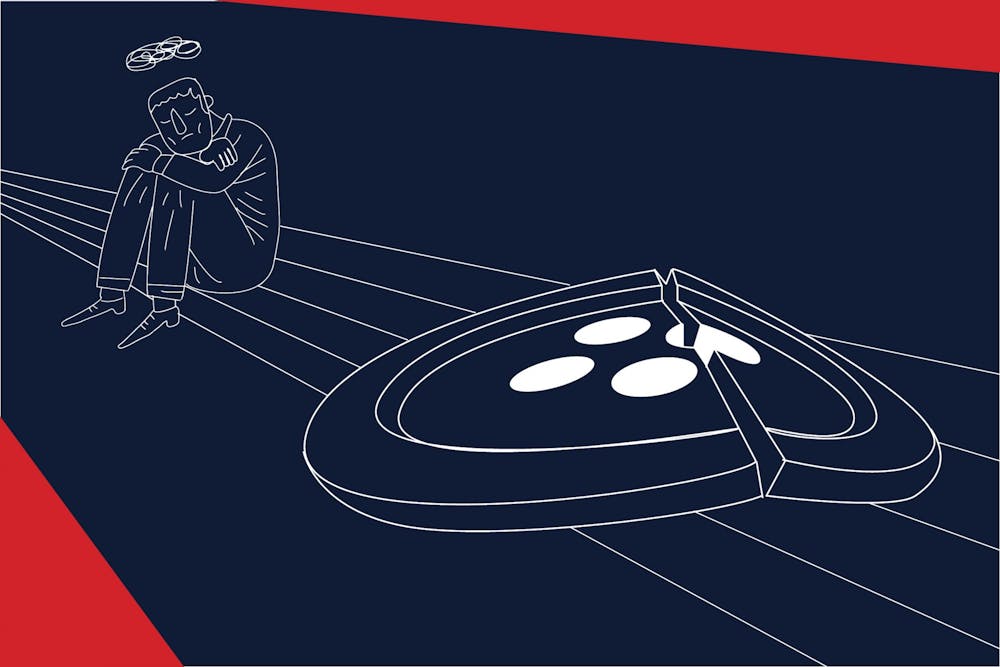
Death is not a subject to be exclusively thought of in academia or when covered in frosty sheets on deathbeds; it is also something that you can talk about with your friends on a walk to Commons.
Credit: Jesse ZhangAre you afraid of death?
That’s one of my favorite questions to ask people right after introducing myself to them on campus. After all, the universe itself is void of any transcendent meaning—our existence was a pure accident, a mere contingency, the result of an unimaginable number of arbitrary moments that culminated together. So, why should I wake up the morning and bother to work to exhaustion on problem sets so I can attain a degree, only to be coerced to sell my labor in a market that exploits my ambition for commercial gain, to supposedly better a world that I did not event consent to being born into to begin with?
Existential anxiety typically entails a feeling of distress related to one’s placement in the universe, meaning, choice, and freedom. Reports from the GAPSA survey indicated that approximately half of Penn graduate students expressed feeling "so depressed it was difficult to function." Considering the fact that the survey was conducted in 2018, and given Penn’s history with suicide, it is safe to assume that the isolation resulting from the COVID–19 pandemic only impoverished the mental wellbeing of the student body on campus further.
I regard myself as someone who is, in general, highly content with life, but is contentment enough to make one immune to existential anxiety? I'm inclined to say no, but there is a way out. As the existential philosopher Emil Cioran put it, “The fact that life has no meaning is a reason to live—moreover, it is the only one.” While death remains a sensitive and delicate problem, alleviating existential anxiety doesn’t come from shying away from death—it comes from facing death head–on.
Existential anxiety, cosmological loneliness, occasional despair, nostalgia, and melancholy are integral parts of the human condition and we should treat them as such. Emil Cioran thought that we either rationalize those feelings away or get distracted to avoid their contemplation. As Penn students, we may very well excel at this skill; we are good at concealing our existential anxieties through binge drinking or extravagant purchases like our stereotypical Canada Goose jackets. Cioran thought that neither of those approaches were sustainable.
Similarly, Albert Camus, the famous philosopher and novelist, regarded that the absence of hope and the irrationality of the universe are sensible conclusions and as such, should not be met with stigma. Both Camus and Cioran assert that existence is absurd, and Camus elaborates how human’s inherent necessity to relentlessly be a pursuit of meaning manifests itself in a universe void of it, and moreover, that struggle perpetuates itself without termination. In "The Myth Of Sisyphus," when explaining the notion of the absurd, Camus says, "It is that divorce between my mind that desires and the world that disappoints, my nostalgia for unity, this fragmented universe and the contradiction that binds them together... Living is keeping the absurd alive. Keeping it alive is, above all, contemplating it."
Emil Cioran was bothered that the default state of response whenever we tell our friends about having experienced existential angst is that we are usually met with a look of concern and judgment, even though we might be simply understanding the universe in universe’s terms. In other words, there is value in comprehending how inescapable existential anxiety is to the human condition and that the suppression of such a vital component of existence is destructive. By positively shifting our attitude towards death into a more acceptable one, we create a medium of communication that is more vulnerable, honest, and as such, by talking more openly about death and its tangential implications, we create a sense of belonging.
Postmodern philosopher Michel Foucault, even though diverging from the ancient Stoics in some respects, viewed death in a somewhat similar way to them. He considered death a subject worthy of meditation as it increased an individual’s agency in terms of their control over their future. He is quoted as saying, “What accounts for the particular value of the death meditation is not just the fact that it anticipates what is generally held to be the greatest misfortune; it is not just that it enables one to convince oneself that death is not an evil; it offers the possibility of looking back, in advance as it were, on one's life.”
Such an honest approach to the topic of death on campus would facilitate discourse among students that would make “Penn Face” obsolete. Death is not a subject to be exclusively thought of in academia or when covered in frosty sheets on deathbeds; it is also something that you can talk about with your friends on a walk to Commons. The next time in which you will experience a moment of existential angst might not be approaching anytime soon, but until then, memento mori.
ARTUR VLLAHIU is a rising College sophomore from Kosovo studying philosophy, politics, and economics. His email is arturvhh@sas.upenn.edu.
The Daily Pennsylvanian is an independent, student-run newspaper. Please consider making a donation to support the coverage that shapes the University. Your generosity ensures a future of strong journalism at Penn.
Donate







